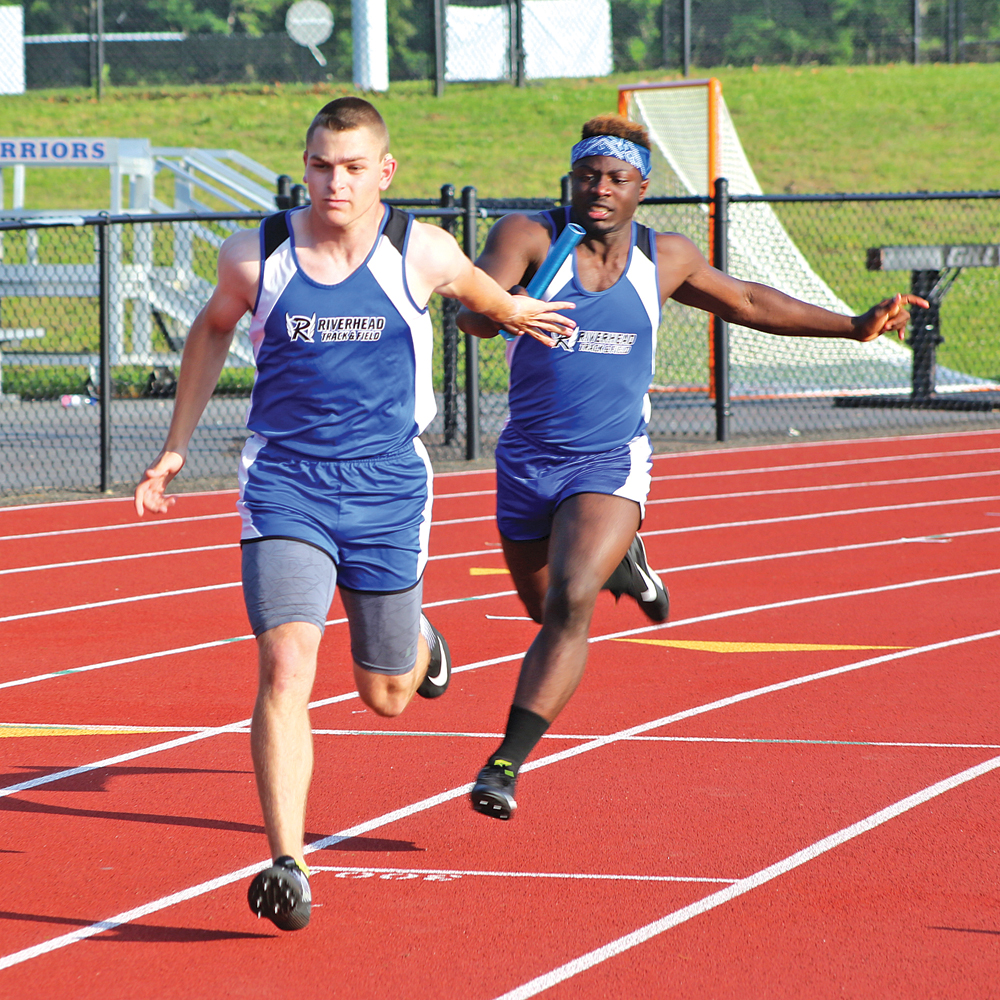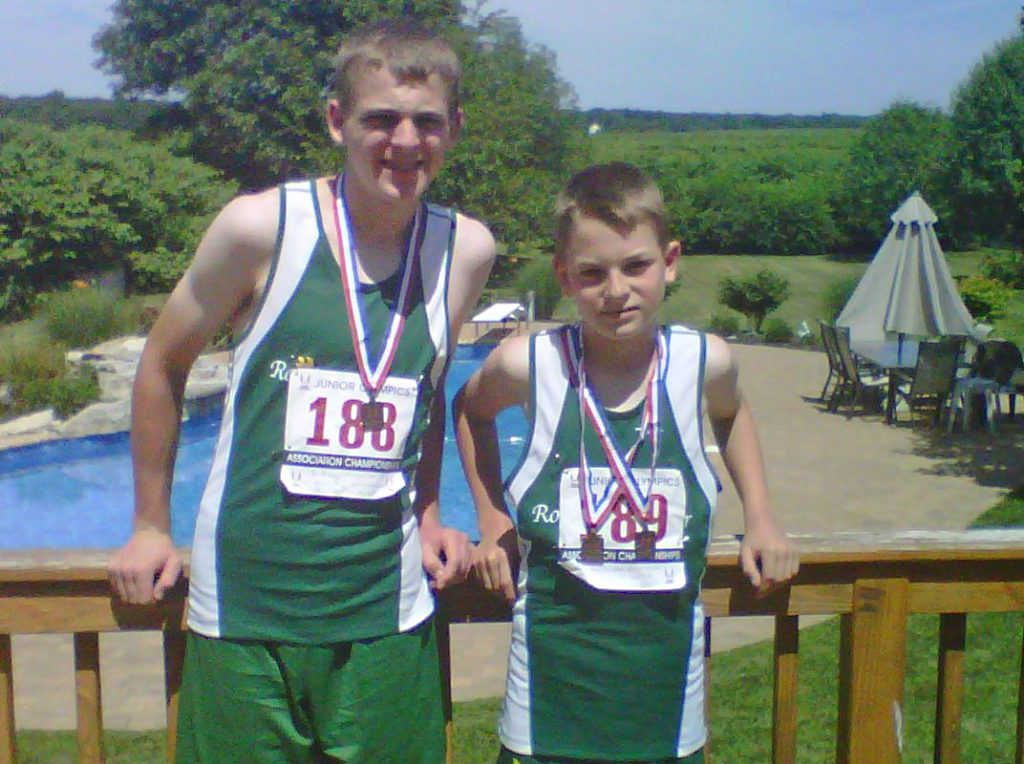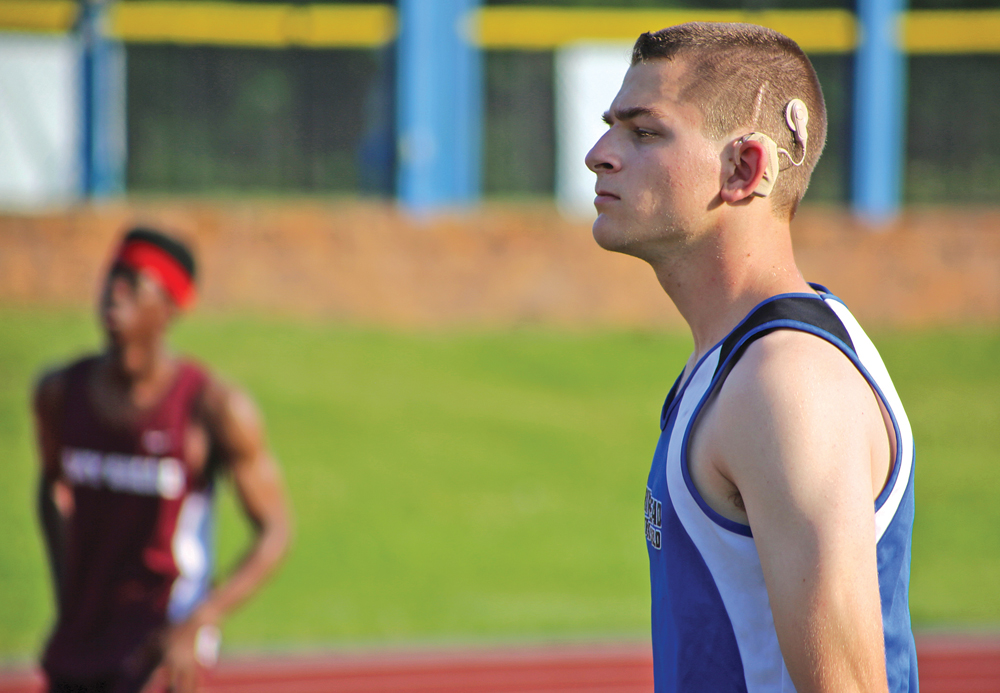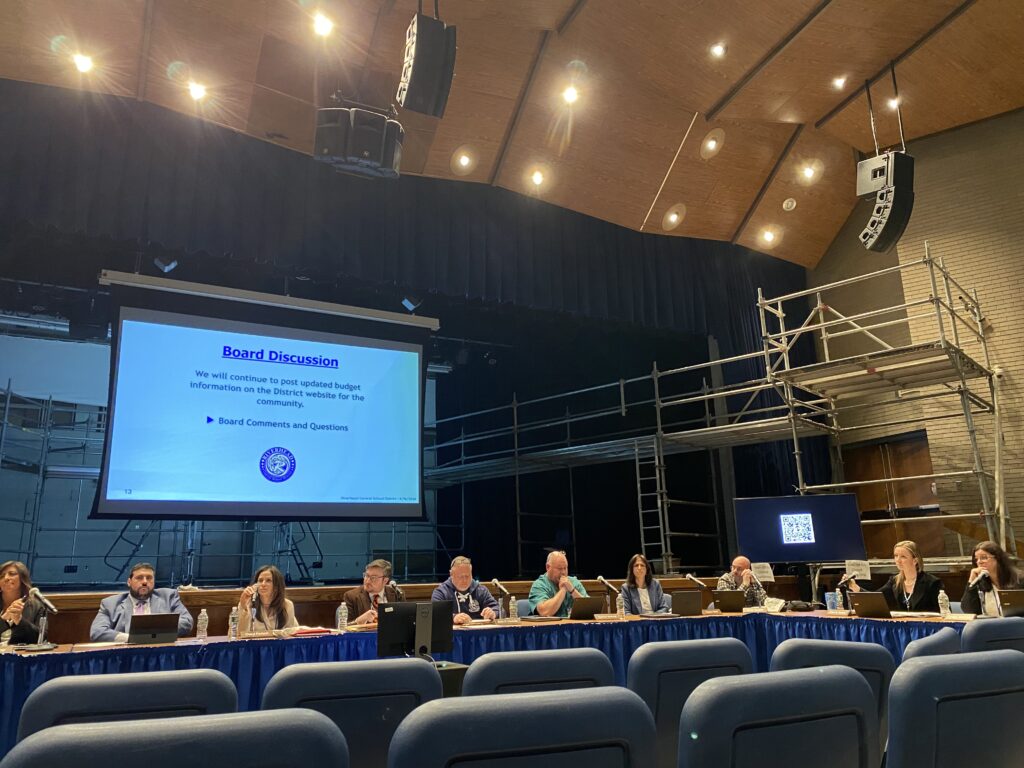Out of the silence emerges a talented sprinter: Riverhead’s Nick Mammina

As he begins to sprint, the world falls silent.
The crowd noise shuts off as if hitting a mute button. He hears no footsteps of the sprinters next to him, no instructions shouted by coaches.
Just silence.
“It’s like being in a dark room,” Nick Mammina said.
For Nick, a senior on the Riverhead track and field team, the silence can be comforting.
“I’m focusing on me, not the sound,” he said Friday as he prepared to race in a relay event at the Section XI State Qualifier Championships at Comsewogue High School.
As the race began a short time later, Nick crouched on the track at the 100-meter mark where he waited for teammate Chris Debose, the lead-off runner, to transfer the baton in the 4 x 100-meter relay. As Nick began to sprint, he grasped the baton in his left hand and raised his opposite hand toward his left ear to disconnect the cochlear implant that allows him to hear.
As far back as he can remember, Nick’s hearing ability has been made possible through the surgically implanted electronic device. A sound processor captures audio that is transformed into digital code. The implant converts that code into electrical impulses that are sent to the brain and are interpreted as sound.
Nick suffers from complete hearing loss and the cochlear implant brings audio to life in his left ear. He remains deaf in the right ear.
It’s the only life he’s ever known.
To this day, Nick still fields questions on a nearly daily basis about the device attached to his ear, which resembles a hands-free cellphone accessory at a quick glance. He’s grown accustomed to it over the years and doesn’t mind explaining it. After all, he’s never let the disability define him. His coaches train him like any other athlete on the team. And he’s blossomed into one of the team’s top sprinters, competing in both the 100-meter and 200-meter dashes as well as the 4 x 100. He’s excelled academically and even became an Eagle Scout.
Following graduation later this month, Nick will prepare to attend Rochester Institute of Technology to pursue a degree in engineering while also running on the school’s Division III track and field team.
“He’s been wanting to be an engineer forever,” said his mother, Jen Mammina.
Nick’s story is one of dedication, hard work and perseverance. He was a fighter from the moment he was born. He had no choice — he was born 6 1/2 weeks premature and soon after suffered from respiratory syncytial virus, an infection of the lungs and respiratory tract which can lead to potentially life-threatening complications. Babies born premature are more susceptible to the virus.
Seeing no improvements at first, his parents expected him to be transferred to Children’s Hospital of Philadelphia. They never had to make the trip. Seemingly out of nowhere, Nick improved and within a few days they were on their way back home after what had been a long and stressful ordeal. It was when Nick was about 7 months old that his parents first became concerned with his hearing. They had sold their home in Rocky Point and were living with Ms. Mammina’s in-laws as their new home in Wading River was being built. Ms. Mammina said she noticed how Nick would seem startled when she approached him. It seemed odd considering she was walking on hardwood floors.
She set him in his high chair and used a pot and spoon to make noise behind him. He didn’t flinch.
He was diagnosed as deaf soon afterward. They experimented with a few hearing aids at first. At 22 months old, Nick become one of the youngest toddlers at the time to be eligible for a cochlear implant, a device that doesn’t necessarily work for any person suffering hearing loss depending on the type of damage to the ear. Typically, doctors waited until a child was 2 years old before doing the procedure, Ms. Mammina said. But she got a phone call from the doctor’s office on an October day telling her the insurance company had approved the device and Nick could undergo the procedure the next day.
“It was the best thing we could have ever done,” she said. “He’s done beautifully. He has great speech. He’s an impressive kid.”
•

Riverhead track and field coach Sal Loverde has known Nick long before he joined the Blue Waves. Mr. Loverde, a special education teacher, coached Nick’s older brother, Anthony, who graduated in 2013. Anthony suffers frequent seizures and found comfort in running. He began training at a local running club called Rolling Thunder and ended up at the Junior National Olympics.
It was Anthony who first inspired Nick to begin running. Nick gravitated more toward speed events. (Anthony, now 22, has since retired from running).
“He’s one of our most consistent kids we’ve had,” Mr. Loverde said. “He’s a very dedicated kid. Hard working at practice. He does everything you ask.”
A quiet kid when he first joined the team, he has since blossomed into a leader, specifically as a senior on the 4 x 100 relay team that also includes two sophomores. Mr. Loverde said he never would have predicted at the beginning of the season that this relay group would elevate to the level that it competed at the state qualifier meet.
“A lot of that result is because of the efforts of Nick working with those kids and wanting it,” he said. “He really wanted to take things as far as he can go.”
At the Division I Championships in late May, the Blue Waves’ quartet of Nick, senior Chris Debose and sophomores Ethan Martin and Tyreek Parker ran 45.61 seconds in the finals to finish fourth and qualify for the meet last Friday.
“It just gelled this year,” Ms. Mammina said of the relay team.

Friday’s race didn’t end as the team hoped. A lane violation disqualified the team, so the group did not advance into the finals for a chance to earn a trip to the state meet. But the experience of competing on the big stage was an accomplishment that made the hard work worth it.
“This year was the best season I ever had,” Nick said, noting his success this year helped convince him that he could compete at the collegiate level.
While many of his friends were scrambling to decide on colleges, Nick relaxed knowing he had his sights set on RIT. He was so determined to attend the school, he didn’t bother applying anywhere else. When his parents questioned him on whether he had a backup plan, he told them no. As a last resort he could attend Suffolk County Community College, he reassured them.
Sure enough, he received in acceptance letter in March. RIT offers a specific college geared toward deaf students: the National Technical Institute for the Deaf. When he was first introduced to the school by his hearing teacher, Christine Lohr, who is based out of Eastern Suffolk BOCES, Nick said he wasn’t so sure about it. But he knew he wanted to pursue civil engineering. Two years ago, he went to a summer program at the school and found it was the place for him.
“They provided everything I needed, from note taker, to someone that reads a test for me,” he said. “I said, ‘That’s it, I’m going to go here’ and I stuck to that college all my high school years.”
The hearing impairment presents a challenge to Nick in the classroom. While he’s naturally inclined toward science, he can struggle with reading comprehension, which makes taking tests more difficult.
Ms. Mammina said the support Nick’s received at Riverhead has been “phenomenal.” Elizabeth Chappell, the director of the special education program, has known Nick for many years, dating back to when she worked with Anthony.
“Nick is a very inspiring story,” Ms. Chappell said in an email.
Ms. Chappell is retiring at the end of this year and Ms. Mammina said she was thankful to see her continue through the end of Nick’s high school tenure.

Nick’s parents were naturally concerned when he began school as a little kid as to how fellow students would treat him. They feared he might be bullied.
Those fears never manifested. His classmates were mostly fascinated by his device. Some would ask how him how could have a cell phone attached to his ear.
Over the years, advances in technology have made life easier, specifically with books on tape so he can hear the words as he reads them. Nick’s mom noted Apple products are specifically helpful for someone who’s hearing impaired.
“He’s a good advocate for himself,” she said.
He’ll face additional challenges at RIT as he learns how to interact with fellow deaf students who may not have the benefit of a cochlear implant. To prepare, he’s learning sign language.
His mom has already cried at the thought of her son going away to college and leaving home. His parents typically wake him up in the morning, so his mom asked him what he planned to do in college since he can’t hear an alarm clock with the device off his head at night.
Like with any challenge, Nick found a solution: a vibrating alarm that’s strong enough to wake him.
“You tell him he can’t do something, he’s like, ‘No, I can do it. I’ll make it happen,’ ” his mom said. “He always has. His whole life he’s been that way.”









